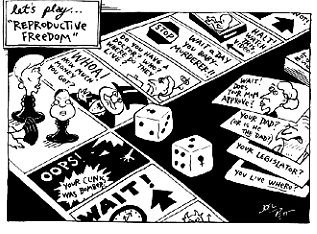A “Feminist” Curbs Second Trimester Abortion Rights!
Just yesterday, we featured Dr. Dalvie’s blog on what it means to be prochoice. Now it is time we wondered about something similar: what does it mean to be feminist.
Very recently, the British minister for Women and Equality, Ms. Maria Miller, who calls herself a modern feminist, called for a reduction in the abortion limit from 24 weeks to 20 weeks in Britain. According to Ms. Miller, her claim does not make her any less pro-woman. “What we are trying to do here is not to put obstacles in people’s way but to reflect the way medical science has moved on,” she said, referring to advancements in neonatology that makes it possible for a baby born at 24 weeks to survive. Second day news stories refuted her claim, saying that not all premature babies live to celebrate their fifth birthdays.
 But science or no science, Ms. Miller’s statement ignores certain primary reasons for abortion. Dr. Christian Fiala from Austria, a member of the worldbytes forum, voiced this concern eloquently, “Women don’t ask for an abortion because of the current status of their pregnancy, they ask for a termination of a pregnancy because they can not provide what is needed to raise a child in a responsible way. The decision on abortion is about the future, not about the present. This fundamental aspect is ignored in the public debate.”
But science or no science, Ms. Miller’s statement ignores certain primary reasons for abortion. Dr. Christian Fiala from Austria, a member of the worldbytes forum, voiced this concern eloquently, “Women don’t ask for an abortion because of the current status of their pregnancy, they ask for a termination of a pregnancy because they can not provide what is needed to raise a child in a responsible way. The decision on abortion is about the future, not about the present. This fundamental aspect is ignored in the public debate.”
Needless to say, Ms. Miller is not very popular among prochoice feminists on social media either. When we tweeted her statement, we received a very quick response from Ms. Mara Martinez Morant, a professor of social anthropology at the University of Barcelona, saying,” My body, my life, my decision, regardless of the scientific and technological advances. I decide not others!”
The Internet Citizen TV company, also called WORLDbytes, filmed an interview with women right’s activist Dr. Ellie Lee. Though her talk is long, Dr. Lee makes her case for abortion in the first few minutes, stating that every pregnancy has to have an outcome – either safe abortion and safe motherhood, and that both choices should be treated with respect.
She even calls for the British abortion law of 1967 to be replaced by a more enabling, rights-based law. The current law acts as an exemption clause by listing only those conditions under which women need not be punished for an abortion. It does little to empower women, support their rights, or protect their providers from anti-choice attacks. This issue is not restricted to the British shores. A rights-based approach has not been incorporated in several countries across the world, and Asia, where abortion is legalized.
Ms. Miller’s statement also opens an old can of worms: who can decide when and how second trimester abortions can be performed. (Read Dr.Suchitra Dalvie’s nuanced discussion on the many layers of choice) Currently, even in countries where abortion is legal, doctors are heavily scrutinized for performing abortions above 20 weeks. In some cases, this service puts them in harm’s way. Such violence against practitioners has been recorded in developed and developing countries.
Any limit on abortions therefore turns into a Catch 22 for the provider. He or she cannot turn the patient away knowing she will risk an unsafe abortion, but cannot perform the abortion without risking his or her career and life. In these cases, a comprehensive law protecting the doctor’s interests would actually promote access to safe abortion.
And this is specifically why it is very disconcerting when politicians who call themselves feminists, curb the rights of women and their care providers. Though Ms. Miller can play innocent, her need to reduce the abortion limit, makes her anti-choice and therefore anti-woman. I wholeheartedly agree with Dr. Lee instead when she says, “abortion should be provided to women by law and in practice as early as possible, and as late as necessary.” Yes, because then we are asking women what they want, not telling them in patronizing tones what they need.






